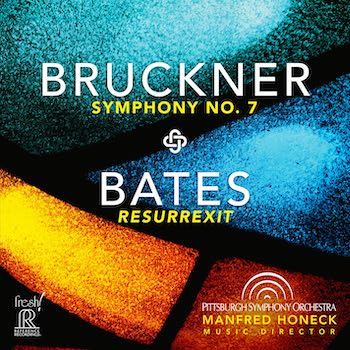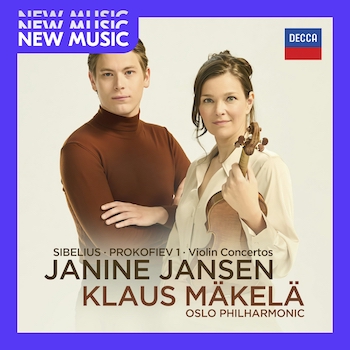Classical Album Reviews: Manfred Honeck Conducts Bruckner and Janine Jansen Plays Prokofiev & Sibelius
By Jonathan Blumhofer
Conductor Manfred Honeck and the Pittsburgh Symphony deliver a conspicuously satisfying and fluent Bruckner Seventh. Dutch violinist Janine Jansen also possesses an uncommon ability to enliven the familiar.

You know you’re in good hands with Manfred Honeck conducting the standard repertoire: few conductors bring such freshness and insight to the canon as he does. And there’s something particularly right about this recording of Anton Bruckner’s Symphony No. 7 with the Pittsburgh Symphony.
Maybe it’s the shared understanding of traditional Austrian musical values. Maybe it’s the common spirituality (like Bruckner, Honeck is a devout Catholic). Whatever the situation, theirs is a conspicuously satisfying and fluent Bruckner Seventh.
From the beginning, Honeck and his forces embrace the music’s immense sense of space: the first movement’s opening theme emerges like an Alpine peak out of the mist. Yet for all the grandeur of the orchestra’s playing here – they sound resplendent and tempos are often noble and unhurried – there’s never a lack of musical direction or rhythmic purpose to the performance. Rather, Honeck ensures that the ensemble’s attention to issues of dynamics and the musical line are always at the forefront, its moments of quiet mystery as wonderfully intense as its climaxes are blazing.
Ditto for the great Adagio, whose excellent balances, textural clarity, huge dynamic range, and impeccable sense of pacing infuse this memorial to Wagner with the sense of majesty the music demands. For sweep and power, it ranks with Karajan in ‘89 and Böhm in ‘76 (though, interestingly, Honeck’s timings are slightly faster than both of theirs).
The third movement mixes muscular, driving rhythms with light-footed turns and some impressively sonorous contributions from the orchestra’s bass voices. In the finale, Honeck plays up the music’s strong plays of musical contrast: tightly-wound, crisp rhythms one moment, flowing lyricism the next. Taken with his purposeful tempos and natural underlining of the music’s rhetorical qualities, there’s a cathartic aspect to this reading that compensates for Bruckner’s periodically frustrating motivic repetitiveness.
There’s none of the last to be found in Mason Bates’ Resurrexit, a 10-minute-long curtain-raiser that fills out the album. Based on the medieval “Victimae Paschali laudis” chant, it’s well-scored and effective. Bent-note figurations over the opening minutes lend the score a vaguely Middle Eastern quality and the lively second half culminates in a genuinely thrilling ending. Honeck and his Pittsburghers play it for all it’s worth.
 Another artist who possesses an uncommon ability to enliven the familiar is the Dutch violinist Janine Jansen. Her new recording of concertos by Jean Sibelius and Sergei Prokofiev (his No. 1) is more than invigorating; it’s electrifying.
Another artist who possesses an uncommon ability to enliven the familiar is the Dutch violinist Janine Jansen. Her new recording of concertos by Jean Sibelius and Sergei Prokofiev (his No. 1) is more than invigorating; it’s electrifying.
Part of the reason for this owes to Jansen’s full-throated embrace of her selections’ respective personalities: the Sibelius, inscrutable and brimming with folkloric imperative; the Prokofiev, suave and sleek. Though hers aren’t the only ways to approach this fare, Jansen makes them sound utterly compelling.
The Sibelius unfolds with terrific technical clarity – the violinist’s articulations, fingerings, and voicings project with biting urgency – yet there’s also a fascinating play of light and shadow. Just listen to the contrast between the beginning of the first movement, all cool and mysterious, and the sonorous warmth of the Adagio.
Or the play of rhythms in the finale: vital, gritty, and tough alternating with episodes of swooning, dancing lyricism. All of it explodes with foot-stomping zest; parts take on the apparition of a seductive dance around a campfire.
Prokofiev’s First Concerto, on the other hand, is a picture of wit and delicacy. Jansen shapes her part with an uncanny ear for beguiling phrases and a vital understanding of musical structure. Also character: in her hands, the first movement’s second subject drips with sarcasm, while the Scherzo’s spins out woozily.
The other big story about this recording are the accompaniments Klaus Mäkelä draws from the Oslo Philharmonic Orchestra. Mäkelä’s discography has thus far been weirdly uneven, though he evidently cuts a charismatic presence in-person. Here, either by virtue of Jansen’s presence or for some other reason, the conductor effectively – finally! – squares the circle.
Throughout, Mäkelä and his orchestra sound like they’re an extension of the soloist, and vice versa. For balance, rhythm, color, and spirit, these are brilliantly unified performances. Look no further than this team’s luminous account of the Sibelius’s slow movement, with its popping inner voices and impeccably measured juxtaposition of puzzle-like thematic ideas. Or the collective’s tonal blend in the finale of the Prokofiev, with its shimmering, otherworldly coda.
For filler, Jansen and Mäkelä, who’s a cellist, team up for a short encore of Sibelius’s “Water Drops.” As with everything else here, it’s a perfectly judged, welcome encore – the aural equivalent of a post-concert (or intermission) shot of Jägermeister.
Jonathan Blumhofer is a composer and violist who has been active in the greater Boston area since 2004. His music has received numerous awards and been performed by various ensembles, including the American Composers Orchestra, Kiev Philharmonic, Camerata Chicago, Xanthos Ensemble, and Juventas New Music Group. Since receiving his doctorate from Boston University in 2010, Jon has taught at Clark University, Worcester Polytechnic Institute, and online for the University of Phoenix, in addition to writing music criticism for the Worcester Telegram & Gazette.
Tagged: Decca, Janine Jansen, Klaus Mäkelä, Manfred Honeck, Oslo Philharmonic Orchestra, Pittsburgh Symphony Orchestra
